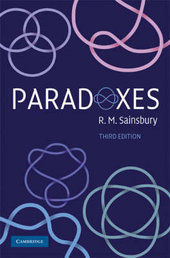
|
Paradoxes
Hardback
Main Details
| Title |
Paradoxes
|
| Authors and Contributors |
By (author) R. M. Sainsbury
|
| Physical Properties |
| Format:Hardback | | Pages:190 | | Dimensions(mm): Height 234,Width 157 |
|
| Category/Genre | Philosophy - logic |
|---|
| ISBN/Barcode |
9780521896320
|
| Classifications | Dewey:165 |
|---|
| Audience | |
|---|
| Edition |
3rd Revised edition
|
|
Publishing Details |
| Publisher |
Cambridge University Press
|
| Imprint |
Cambridge University Press
|
| Publication Date |
19 February 2009 |
| Publication Country |
United Kingdom
|
Description
A paradox can be defined as an unacceptable conclusion derived by apparently acceptable reasoning from apparently acceptable premises. Many paradoxes raise serious philosophical problems, and they are associated with crises of thought and revolutionary advances. The expanded and revised third edition of this intriguing book considers a range of knotty paradoxes including Zeno's paradoxical claim that the runner can never overtake the tortoise, a new chapter on paradoxes about morals, paradoxes about belief, and hardest of all, paradoxes about truth. The discussion uses a minimum of technicality but also grapples with complicated and difficult considerations, and is accompanied by helpful questions designed to engage the reader with the arguments. The result is not only an explanation of paradoxes but also an excellent introduction to philosophical thinking.
Author Biography
R. M. Sainsbury is a Professor in the Department of Philosophy, University of Texas at Austin. He also teaches in the Department of Philosophy, King's College, London. He was editor of the journal Mind for a decade from 1990 and his many publications include Reference Without Referents (2005, 2007) and Logical Forms, 2nd Edition (2000).
Reviews'An engaging and accessible guide through some of the deepest conceptual labyrinths we know. Sainsbury encourages the reader to think with him, always asking questions and pointing out roads not taken. This is the first place I send students who have become puzzled by the liar paradox or the paradox of the heap.' John McFarlane, Associate Professor of Philosophy, University of California, Berkeley
|